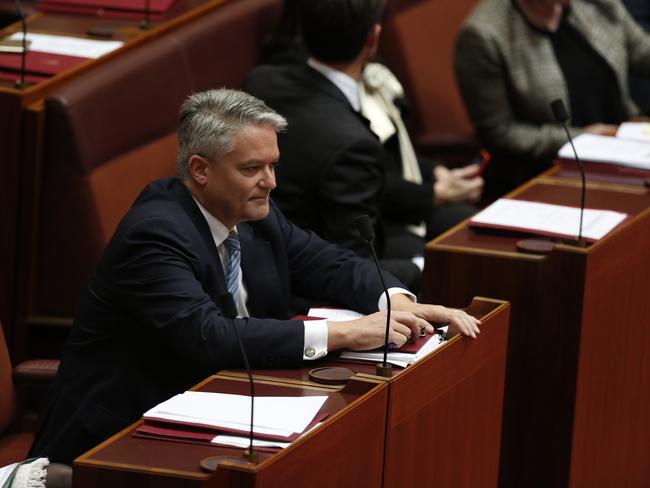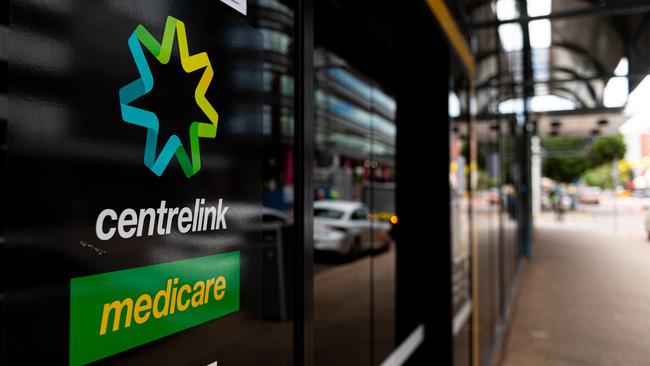JobKeeper payments reduced to $1200, $750 for part-time workers, PM confirms
JobKeeper will be extended into next year, but at a slashed rate that will be even harder for businesses to qualify for.
Economy
Don't miss out on the headlines from Economy. Followed categories will be added to My News.
JobKeeper will be extended for Australians until March at a slashed rate of $1200 a fortnight and shift to a new two-tiered payment that’s tougher to qualify for, Prime Minister Scott Morrison has confirmed.
Mr Morrison announced the extension of the scheme on Tuesday beyond the original September end-date and changes to its rate, as well as changes to the future of the JobSeeker unemployment payment.
As revealed by news.com.au, JobKeeper will be extended at a lower rate when the original $1500-a-fortnight scheme ends in September, but will remain at a rate of $1200 a fortnight until March, down from $1500 a fortnight.
But a new, part-time rate will be offered to casuals after confirmation that around one in four workers on JobKeeper were securing a pay rise that was worth $550-a-fortnight on average – the same amount as the JobSeeker coronavirus supplement. Part-time workers will now get $750 a fortnight from September.
And businesses will now need to prove a downturn over six months to pass a tough new turnover test to qualify for the payment, Mr Morrison has confirmed.
The new two-tiered payments follows revelations in a report to be released today that a million casual workers scored a pay rise worth up to $7700 on JobKeeper.
The surprise bonus was delivered to an estimated 875,000 long-term casuals who qualified for the $1500-a-fortnight JobKeeper payment.
The COVID-19 pay rise was worth up to $550 a fortnight on average for the one four workers overpaid and rose to $7,700 over the full six months of the scheme.

Finance Minister Mathias Cormann earlier said the review confirmed JobKeeper was working and that the case for an extension for companies still impacted by government-ordered shutdowns had been made.
“The review of JobKeeper found that the program has been well targeted to those businesses that suffered an average decline in turnover in April of 37 per cent compared to the same month last year,’’ he said.
“What the review also found was that there were a number of features of JobKeeper that created adverse incentives which may become more pronounced over time as the economy recovers. This formed part of our considerations as we looked at the next phase of the JobKeeper program.
“The Government recognises the need for JobKeeper to be extended, we are conscious that there will still be businesses that will continue to be severely impacted by the coronavirus crisis. But we also want to ensure that ultimately we can transition businesses back into a situation where they are able to pay for the wages of their employees out of their income.”
RELATED: New sliding scale payments for those worst hit

The largest one-off fiscal measure in Australia’s history, JobKeeper was designed to be delivered quickly as thousands of businesses across Australia faced public health restrictions and shutdowns.
According to the ATO, more than 960,000 organisations have been processed for payments covering around 3.5 million individuals.
The Treasury report found there was no evidence of widespread business closures which are currently well below average, due to JobKeeper in combination with mortgage honeymoons and other relief.
The report finds: “There are compelling arguments to maintain JobKeeper in its current form until 27 September. Businesses have planned on the availability of JobKeeper for six months and there are risks in withdrawing support from those that have begun to recover.
“It may also be appropriate at this juncture to consider reducing payments to wean off businesses from ongoing support.”
But there were also perverse incentives in some cases for some workers to refuse to do more hours even if they were getting paid extra under JobKeeper.
“Among JobKeeper employee recipients there are two groups whose incentives to work or to take on additional hours may have been blunted: part-timers and casuals who have received an increase in income due to the flat rate payment, and employees who have been stood down,’’ the report found.
“Several industry stakeholders advised the review team of instances where part-time workers have been reluctant to do additional hours of work more commensurate with the JobKeeper payment, as well as instances where stood down workers have been reluctant to take on any work hours as businesses have begun to re-open in recent weeks.”
RELATED: Thousands of JobKeeper applications rejected over fraud

As expected, companies will also be required to requalify for JobKeeper after September and prove they are still 30 per cent or more down on turnover.
“Practically, this could be done by using a fresh test of turnover decline, using measured or actual turnover change rather than projected change when businesses first applied,’’ the Treasurer review found.
“The virtue of a fresh test is it would ensure that JobKeeper remains well targeted. If JobKeeper is to be extended beyond September, business eligibility should be reassessed at this point, using measured turnover decline.
“Treasury’s overall assessment is that an extension to JobKeeper is needed, coupled with a fresh eligibility test to ensure that JobKeeper is well targeted.”
Originally published as JobKeeper payments reduced to $1200, $750 for part-time workers, PM confirms



